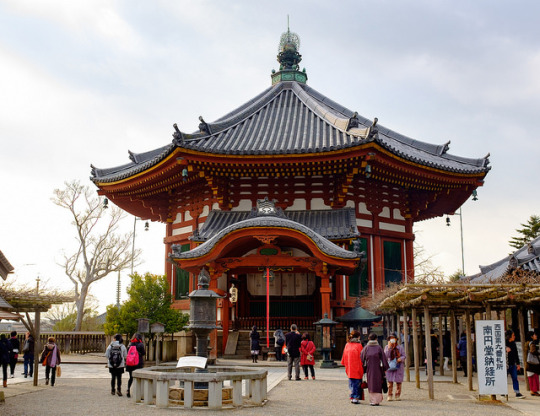#nanendo
Explore tagged Tumblr posts
Text
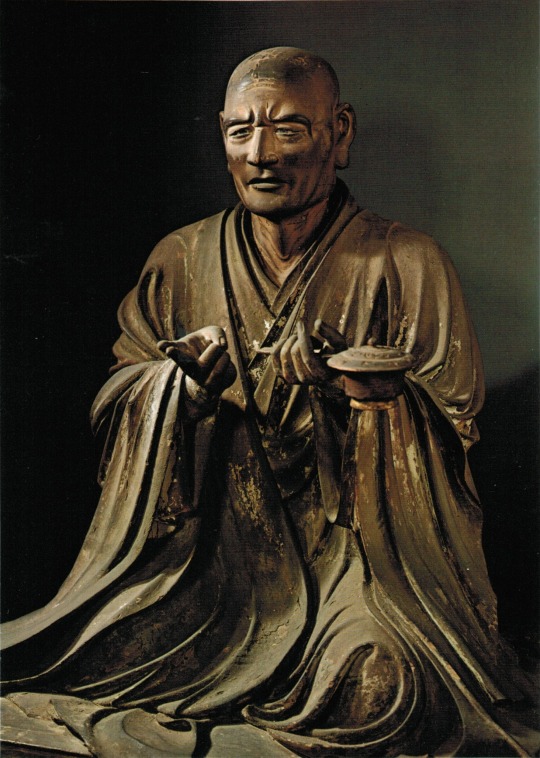
A sculpted image of the monk Genpin (玄賓) (734-818) crafted by the Buddhist artist Kōkei (康慶) and his crew in the late 12th century at the Nan'endō Hall (南円堂) of Kōfukuji Temple (興福寺) in Nara
Image from "運慶と鎌倉彫刻 (日本の美術12)" [Unkei and Kamakura Sculpture (The Arts of Japan 12] by 水野敬三郎 [Mizuno Keisaburō], published by 小学館 [Shōgakukan], 1972, color plate 13
#japanese art#buddhist art#buddhist monk#玄賓#genpin#康慶#kokei#奈良市#nara#興福寺#kofukuji#南円堂#nanendo#crazyfoxarchives#arte japonés#arte budista#monje budista
33 notes
·
View notes
Photo
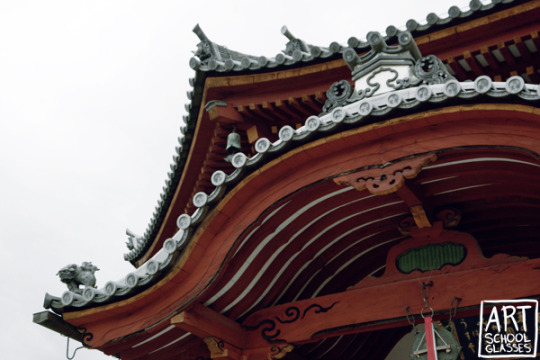
Nan’en-do, Kofuku-ji
Nara, Japan
#nan'en-do#nanendo#nanen do#architecture#kofukuji#kofuku ji#kofuku-ji#nara#japan#asia#travel#my photos
11 notes
·
View notes
Photo
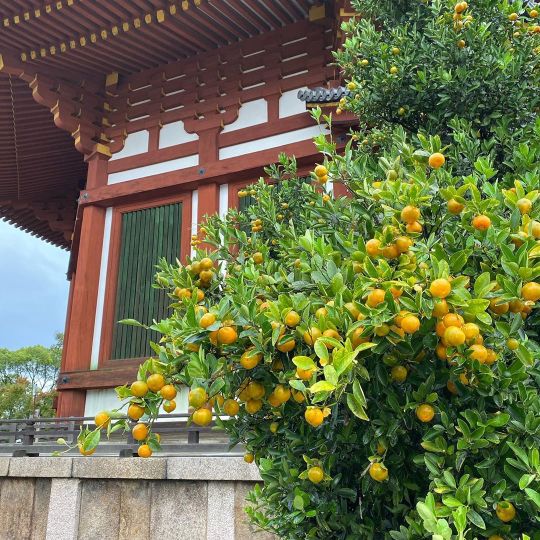
興福寺南円堂前の右近の橘@奈良 #kouhukuji #nanendo #nara #japan https://www.instagram.com/p/B4N2DWoJ4kO/?igshid=1v9y5bffxrem0
1 note
·
View note
Photo
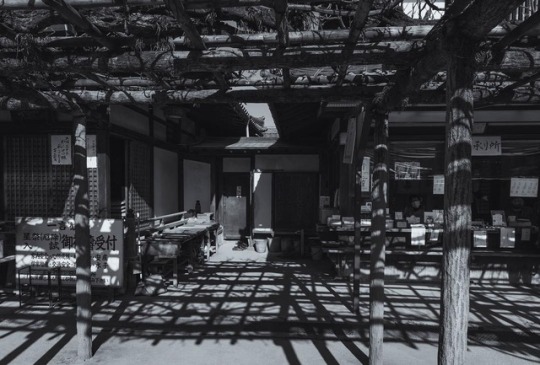
興福寺.南円堂売店 II (Kōfukuji .Nanendo Souvenir Store II) #sonya6000 #sonya6000club #sonyalpha #photography #blackandwhitephotography #lightandshadow #souvenirstore #nanendo #japaneseshop #japanesebuilding #japanesearchitecture #nara #kofukuji #japan #travel (at Kōfuku-ji)
#sonya6000club#japanesearchitecture#blackandwhitephotography#japanesebuilding#lightandshadow#nanendo#sonya6000#souvenirstore#kofukuji#travel#sonyalpha#photography#japan#nara#japaneseshop
1 note
·
View note
Photo
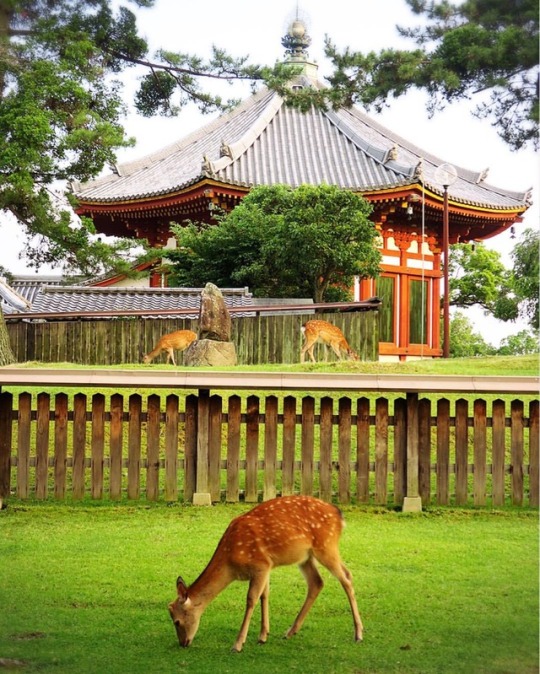
#奈良県#奈良市#奈良公園#南円堂#鹿#🦌#japan#narapark#nanendo
0 notes
Photo
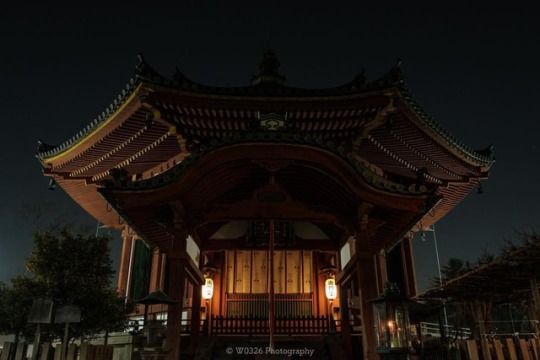
. 💭 いつかの南円堂… 📷 011618 📍興福寺 南円堂 . . 💬 撮らずには帰れない… . . #NARA #Kohfukuji #Nanendo #奈良 #興福寺 #南円堂 #FujifilmXT2 #XT2 (興福寺南円堂)
0 notes
Text
JAPAN 2018: Day 2 – Temple Hopping and Deer Feeding in Nara
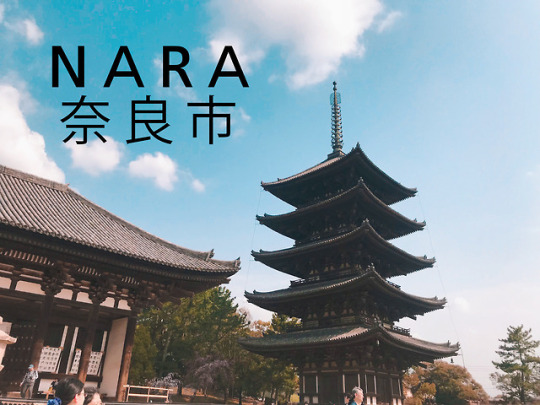
The next morning after wandering the streets of Kobe, we took a refreshing stroll at Utsubo Park, just a 15-minute walk near our hotel, before checking out and heading to Nara. I love how the wind is so gentle like it envelopes you into a cold hug.
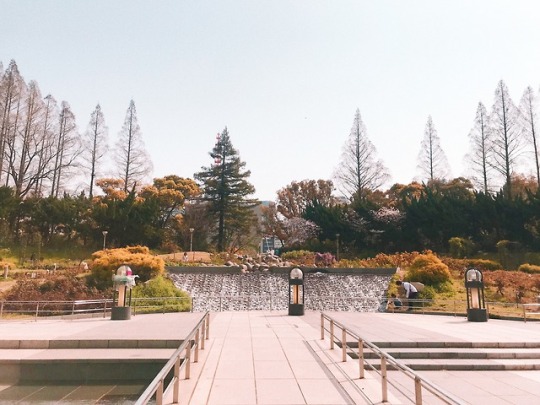
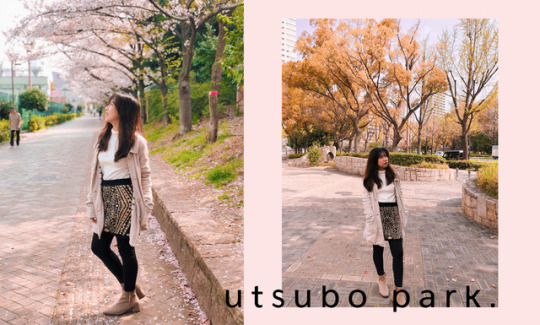
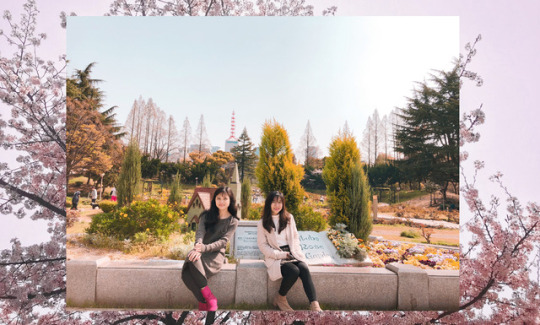
So much for the lovely scenes of flowers and roses, we went back to our hotel by around 10:30 AM to prepare for check-out and head to our next hotel.
After we have settled ourselves in Hotel Zipang, we proceeded to Dobutsuen-Mae Station going to Nara using our 3-day Kansai Thru Pass. It took us approximately an hour to get to Kintetsu Nara Station but it didn’t feel that long because I enjoyed seeing cherry blossoms as we passed by. All I see is pink, melting into the background that nearly block out the sun. (Tip: Take express trains for faster ride going to Nara.)
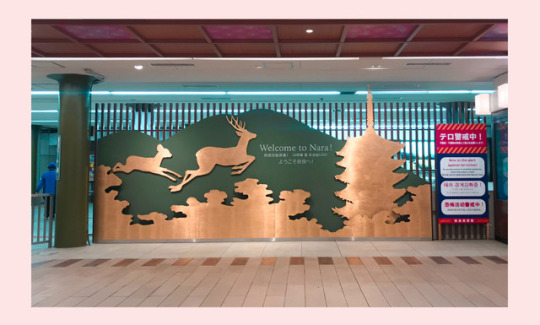
Nara, the ancient capital of Japan, is known for historical temples and a home to hundreds of deer that can freely roam around. During sakura season, the blush-colored trees match the greens and browns perfectly.
From Kintetsu Nara Station, we sauntered going to the first temple we’re going to visit. Kofuku-ji (興福寺, Kōfukuji) Temple (the five-storied pagoda), a Buddhist temple and a UNESCO World Heritage Site, is a landmark and a symbol of Nara. The temple was devastated by civil wars and fires many times but, was allowed to rebuilt and repaired.
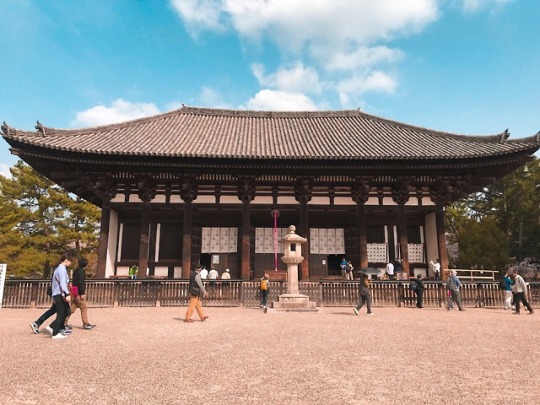
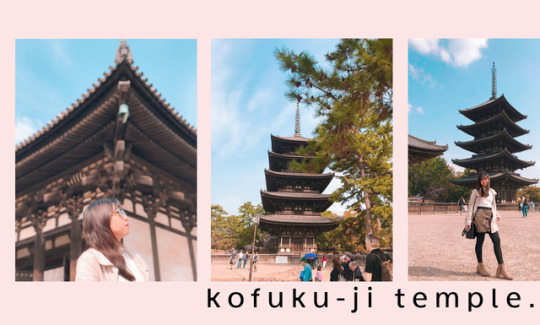
The temple consists of different halls – Tokondo or the Eastern Golden Hall, Gojunoto or the five-storied pagoda, Nanendo or the Southern Octagon Hall, Sanjunoto or a three-storied pagoda, Hokuendo or the Northern Octagonal Hall, and Chukondo or the Central Golden Hall.

Most of Nara’s temple are near each other you can just walk to make your way around the city. Just a few miles away, we paid 500 yen and entered Gangoji Temple.
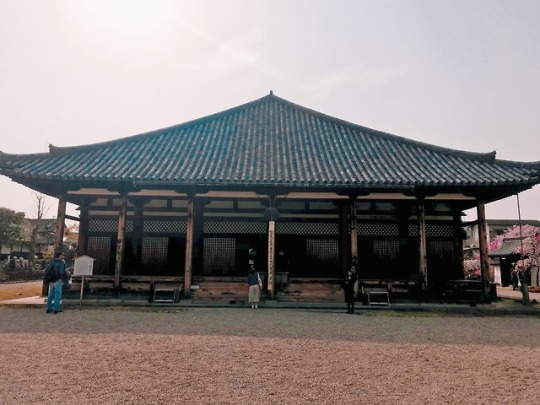
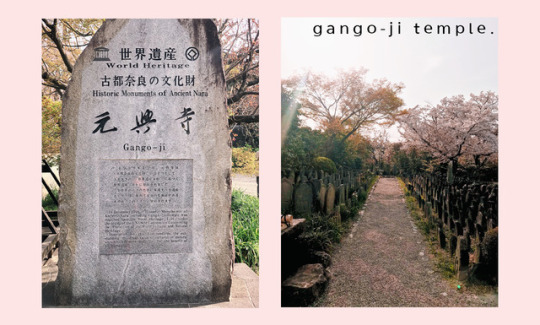
The first Buddhist temple built in Japan and one of the Seven Great Temples in Nara, we wandered around the place which covers the historical site angoji Gokuraku-bo, the old remains of the Buddhist priests’ living quarters, the national treasure Gokuraku-do Hall (main hall of Gokuraku-bo) and the national treasure Zen Room (Gokuraku-bo Zen Room). (Note: Taking photos inside the temple itself is prohibited.) Aside from the temple itself, Jizo statues in groups around the temple caught my interest.
There's solemnity in every temple that we visit. It's like a part of people's lives is etched into it and you'll discover a lot more by wandering through the temples. So natural that Japan had been shaped around it.
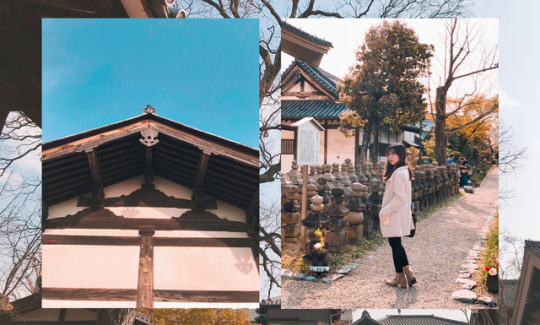
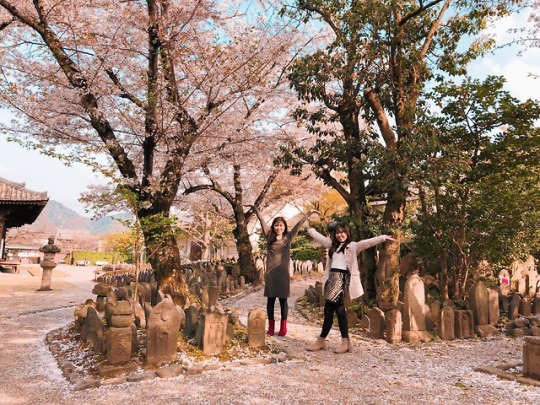
One of the highlights when going to Nara is to see the deer, so we pinned Nara Park to google maps and walked straight after Gangoji Temple. Though it was a very long and tiring walk (sabi ni google maps 5 minutes, naging 15 minutes haha), we got too excited when we saw deers just freely roaming around the park under the cherry blossoms. The deers are very used to humans but I am bit scared when I first went near them. We bought deer crackers in one store around the park for 150 yen to feed these docile deers and to get them closer so we can take pictures.
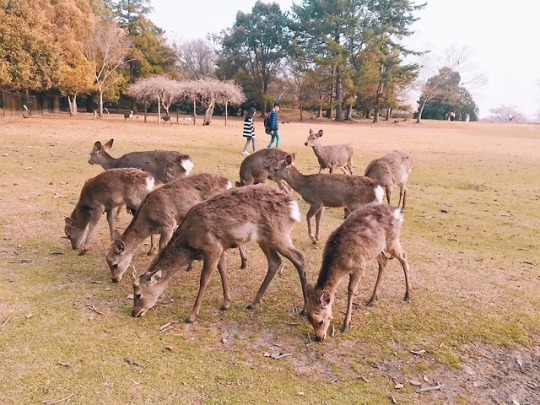
Observing other tourists and residents, there’s a proper way of feeding the deer. By holding the cracker overhead, the deer bows its head one time. Next, put the cracker behind your back, getting the deer to bow a second time. Lastly, hold the cracker overhead one last time, getting that third bow, and then reward the deer with the cracker. Even deers are well-mannered in Japan, how cool is that?!
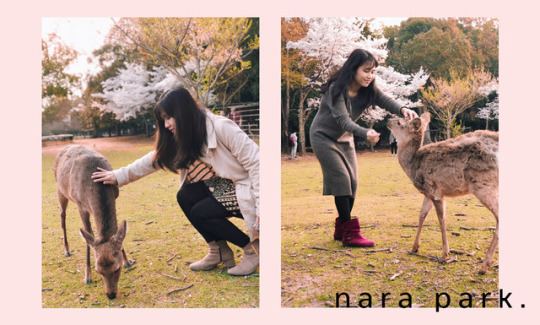
Funnily, while feeding them, I glanced over my shoulder and found that some deers stole our Nara map and happily munched it. My sister and I thought of getting it thinking that maybe it’s our Kansai Rail Map (bukod sa google maps, ito yung buhay namin haha) but we backed away because they looked aggressive. Some deers also chased us even when there’s no crackers left. A bit scary but it was fun watching the deers being adorable and feisty while resting our feet.
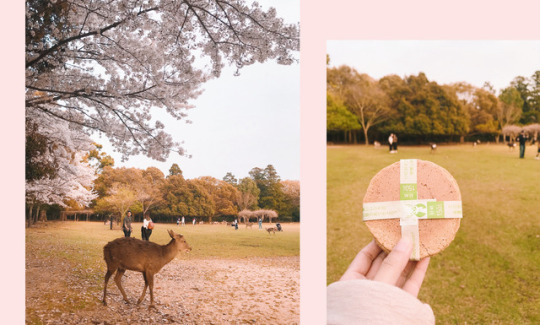
Just a few minute walk along a long pathway, under the shade of tall trees, flanked on both sides by moss-covered, ancient stone lanterns, there is Kasuga-taisha Shrine. Nara’s most celebrated Shrine and established in dedication to a deity responsible for the protection of the city, more temple and shrine can be found at the top of the hill. There were also an abundance of stone lanterns that you can see around the area donated by the shrine’s worshippers.
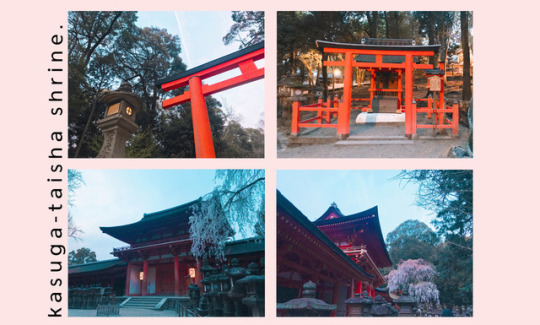
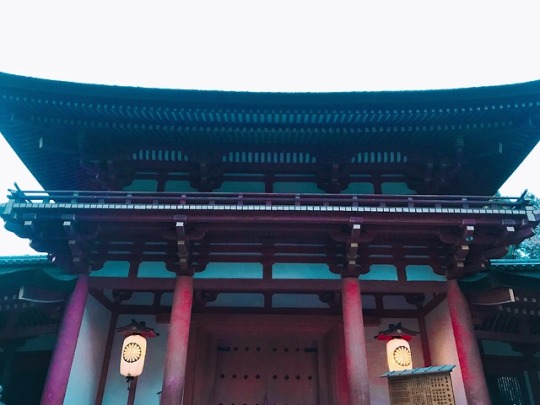
There are actually a lot more things to see around Kasuga Taisha Shrine but since it was getting pretty dark, we opted to return to the station. Along the way, we got lost again but thanks to the ever kind Japanese who approached and gave us the right direction going to Kintetsu Nara Station. The entire trip was quite a bit of walking required so be prepared with comfortable shoes (or tiis ganda tayo sa OOTD aka boots).
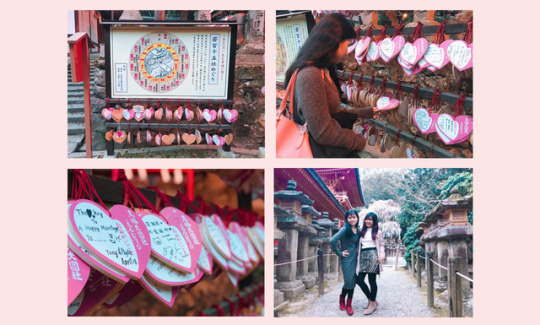
To make our tummies satisfied, we walked down the street near the station to have a dinner before going back to Osaka. Finding a place to eat is quite a difficult task since some of the restaurants don't have english translation in their menu. We just rely on pictures and ended up devouring popular Japanese meals -- omurice and curry.
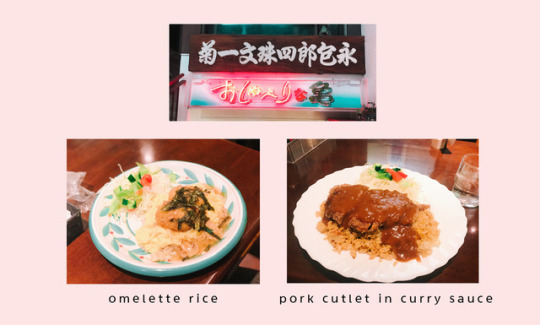
How to go to Nara from Osaka:
Go to the nearest station from your hotel. From Hotel Zipang, the nearest is Dobutsuen-Mae Station.
Ride Tanimachi Line going to Osakauehommachi Station.
From the Station, transfer to Nara Line going to Kintetsu Nara Station, the last station.
From there, you can walk going to Kohfuku-ji Temple (or any of your first destination around Nara).
5 notes
·
View notes
Photo
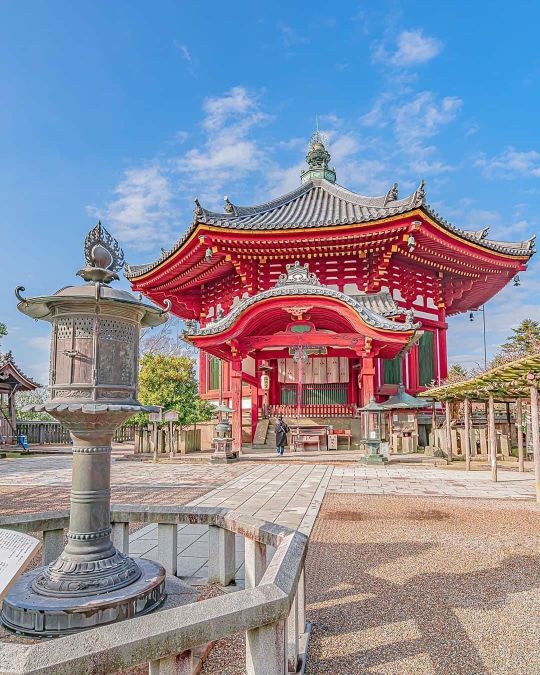
🇯🇵❤️🇯🇵 . . #repost @japantravelcom ・・・ What's your favorite temple that you've visited in Japan, and why did it resonate with you? Nara's Kōfuku-ji Temple has a history dating all the way back to the year 669, and there are a number of important buildings on the temple grounds. This is the "Nanendo", or South Octagonal Hall, and is designated as an Important Cultural Property. 📷: @pic7s -----⠀ 📍#Nara, #Japan .⠀ .⠀ .⠀ . #JapanTravel #MyJapan #narajapan #naraprefecture #japanesearchitecture #japanesetemple #temple #templegrounds #history #historical #culture #dreamnowtravellater #traveler #travelplans #dreamingoftravel #travellove https://www.instagram.com/p/CAprtzVAAEX/?igshid=1vcjmr9r9e6wv
#repost#nara#japan#japantravel#myjapan#narajapan#naraprefecture#japanesearchitecture#japanesetemple#temple#templegrounds#history#historical#culture#dreamnowtravellater#traveler#travelplans#dreamingoftravel#travellove
0 notes
Photo
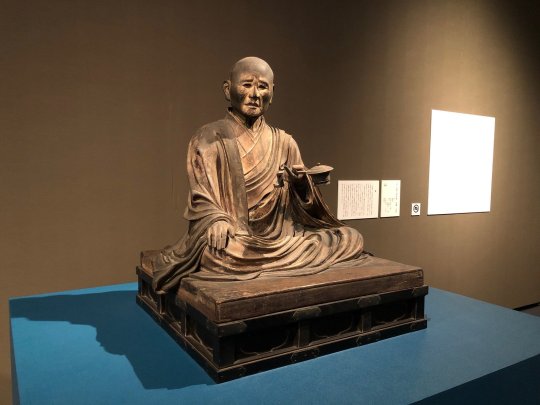
A sculpted image of the monk Jōtō (常騰) (740-815), one of the six patriarchs credited with establishing the Hossō school of Buddhism, the East Asian tradition of Yogācāra or “Consciousness Only,” in Japan
Crafted by the Buddhist artist Kōkei (康慶) in 1189 as part of the larger rebuilding of Kōfukuji Temple (興福寺) in Nara after damage sustained during the recent Genpei War and usually enshrined within the Nan’endō Hall (南円堂) of the temple but here on loan for a special exhibit at the Fukushima Prefectural Museum in Aizuwakamatsu in 2019
Photo from the official Twitter account of the Kōfukuji to Aizuten Jikkō Iinkai (興福寺と会津展実行委員会), August 12, 2019
#japanese art#buddhist art#buddhist monk#常騰#joto#法相六祖#hosso rokuso#康慶#kokei#法相宗#hosso#奈良市#nara#興福寺#kofukuji#南円堂#nanendo#福島県#fukushima prefecture#会津若松市#aizuwakamatsu#福島県立博物館#fukushima prefectural museum
16 notes
·
View notes
Photo
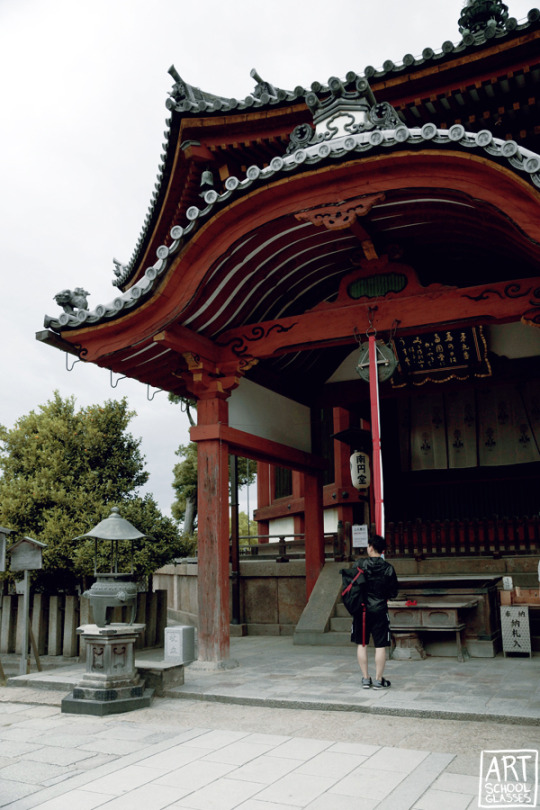
Nan’en-do, Kofuku-ji
Nara, Japan
10 notes
·
View notes
Photo

興福寺.南円堂売店 (Kōfukuji .Nanendo Souvenir Store) #sonya6000 #sonya6000club #sonyalpha #photography #souvenirstore #nanendo #japaneseshop #japanesebuilding #japanesearchitecture #nara #kofukuji #japan #travel (at Kōfuku-ji)
#nanendo#photography#japanesearchitecture#japanesebuilding#sonyalpha#japan#sonya6000#travel#souvenirstore#kofukuji#nara#japaneseshop#sonya6000club
1 note
·
View note
Photo

Nanendo. Estoy mejorando mi técnica para evitar las multitudes, casi consigo el templo totalmente solo, salvo por una señora con barbijo que parece una columna. . #Nara #nanendo #budismo #templo #temple #narapark #japon # (en Nara Park)
0 notes
Photo

Nanendo-Southern Octagonal Hall(南円堂) Kofukuji Temple, Nara, Japan
Sorin(相輪) Metal-work spire set on the top of a pagoda. Suien(水煙) The water flame. They use the word "Water" instead the word "Fire" The word "Fire" was avoided in association with fire.
8 notes
·
View notes
Photo


Kofuku-ji, Nara, UNESCO World Heritage temple. Nan’en-do, an octagonal temple on the site (not pictured), is one of the 33 temples of the Saigoku Kannon Pilgrimage (Saigoku Sanjusansho Junrei), in use for the past 1000 years. Pilgrims have their nyokocho (pilgrim’s stamp book) inscribed and stamped for a few hundred yen. iPhone 5 photos. 11 May 2014.
http://www.taleofgenji.org/saigoku_pilgrimage.html
0 notes

